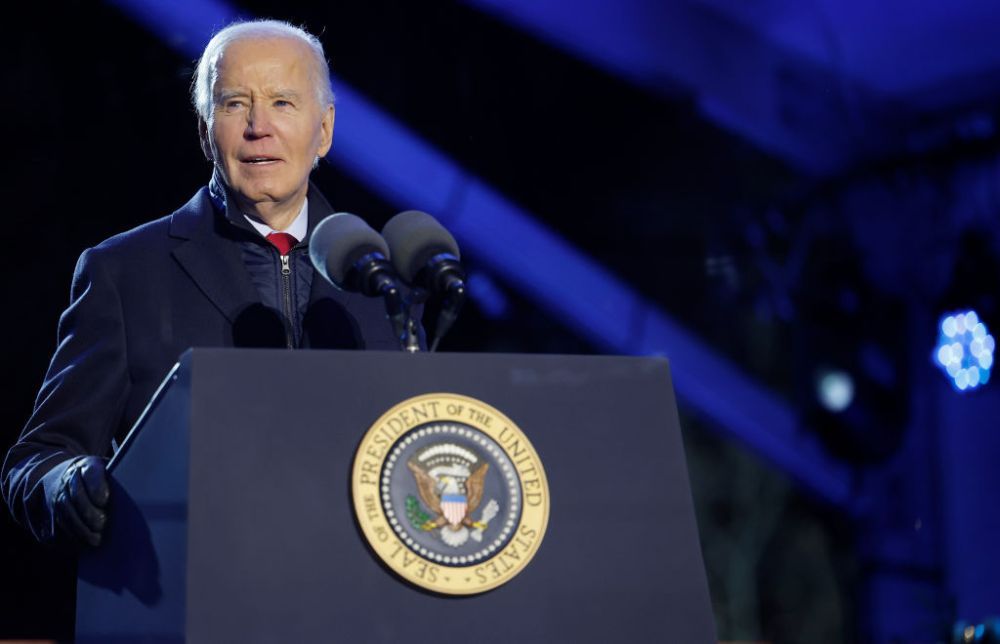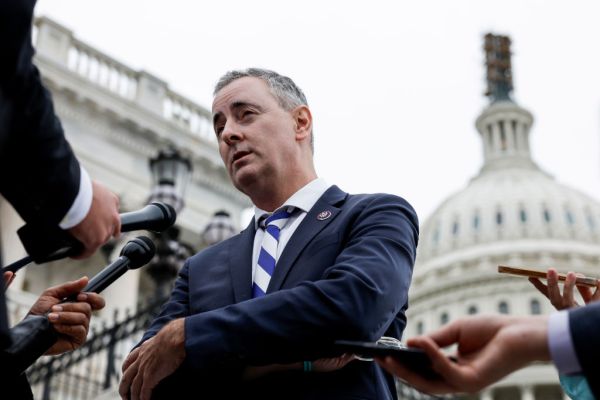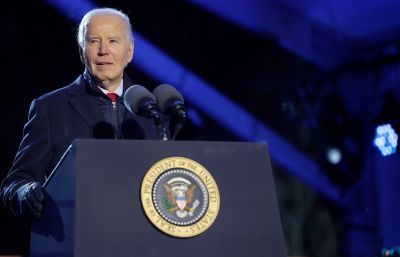Hello and happy Saturday. I don’t know about you, but I’m still getting over the events of last weekend. For someone so powerful not to understand the responsibility that comes with his position, to make such poor choices at a crucial moment and give his opponents nearly unlimited ammunition to use for years to come is a real head-scratcher.
Don’t get me wrong. If coach Ryan Day leads Ohio State to an improbable national championship in the College Football Playoffs, I’ll at least consider forgiving the atrocious strategizing and misuse of talent that led to my beloved Buckeyes losing to hated Michigan for—it pains me to write—the fourth straight year. In Columbus. But it won’t be easy.
Oh, wait. Did you think I was referring to President Joe Biden’s decision to pardon Hunter? You probably were. On Sunday, Biden issued a sweeping pardon giving his son clemency not just for his recent convictions on federal gun charges and tax evasion but for offenses he “may have committed or taken part in during the period from January 1, 2014 through December 1, 2024.” Biden had, of course, claimed repeatedly during Hunter’s journey through the legal system that he would do no such thing. “I abide by the jury decision,” the president said in June. “I will do that and I will not pardon him.”
In The Morning Dispatch, we dove into Biden’s motivation for backtracking—a move that got a poor reception even from many Democrats:
The broad scope of the pardon gets at another potential motivation for it: fear of being targeted by the incoming Trump administration. The president didn’t mention Trump in his statement but said “there’s no reason to believe” the alleged selective prosecution of Hunter Biden “will stop here.”
In Tuesday’s Boiling Frogs, Nick is unimpressed by that argument. If Biden were afraid of retribution from Trump, why did he say so many times that he wouldn’t pardon him? Nick also points to reporting from NBC News that Biden had actually discussed the issue with aides and a decision was made to say publicly that no pardon was forthcoming while leaving the possibility open. Nick cheers the Democrats like Colorado Gov. Jared Polis and Colorado Sen. Michael Bennet who have criticized Biden’s decision, and he laments that those who defend it have essentially adopted the MAGA world’s sense of ruthlessness. He writes: “If American voters aren’t going to punish corruption and ruthlessness by Republican leaders, progressives might reason, Democrats would be fools not to take full advantage of their lowered standards.”
That same day, Mike Warren looked back at several missteps that Biden made during his presidency, and writes that the pardon represents the “coup de grâce for the president’s misreading of his mandate from voters, which was far narrower than he was led to believe: restore normalcy to the White House.”
Is Biden about to make what many would consider another misstep? On Wednesday, Politico reported that Biden aides were debating the merits of preemptive pardons for figures who might find themselves in the crosshairs of the Trump administration—Dr. Anthony Fauci, Rep. Adam Schiff, and outspoken Republican Trump critics such as former Rep. Liz Cheney and outgoing Sen. Mitt Romney. Back to Nick, who debates himself on the idea of preemptive pardons. The argument against pardons is that they would have the effect of making the recipients look guilty of … something, and they would represent a further erosion of the norms of good governance, which have taken enough hits in the Trump era. In the end, though, Nick struggles with the idea that Trump’s critics should be thrown to the wolves. “If you’re mortified by Team Biden’s interest in shielding right-doers for fear of how Trump might use the precedent to shield wrongdoers, you’re drawing a moral equivalence that greatly benefits the wrongdoers,” he writes (🔒).
However one feels about Biden’s pardon of his son (or the potential preemptive pardons of others), is there anything that can be done? A president’s pardon power is pretty absolute, after all. There is one thing, Jonah notes in the Friday G-File: impeachment. After all, he points out, “Congress’ power to impeach and remove is pretty much as absolute as the president’s power to pardon.”
You’d think that’s the kind of argument congressional Republicans would love, given how often they’ve suggested impeaching Biden the last four years. But Jonah suggests it’s the Democrats who are best positioned to perform a little civic hygiene. “Here’s why I think [Republicans] won’t do it,” he writes. “And it’s not because of their abiding interest in norms or fairness. They don’t want to lay down the precedent that such abuse of power is impeachable, because Trump wants that power for himself.”
If you’d like to ask Jonah anything about his column—or anything else, you’re in luck. We’re hosting our first virtual town hall for Dispatch Premium members on Tuesday, December 10, at 8 p.m. ET. He and Steve will take your questions in an ask-me-anything style Zoom call. If you’d like to take part, be sure to join Dispatch Premium before next Tuesday. And I’d be remiss if I didn’t remind you that time is running out to stock up on any Dispatch goodies to give as holiday gifts. Check out our collection of coffee mugs, Dispatch hats and T-shirts, and more.
As always, thank you for reading and for your support. Have a great weekend.
“It’s become an article of faith that the former and future president’s loyalty has its limits. If those within his inner circle of staff, aides, and advisers appear to be doing too well for themselves or pursuing their own interests while working for Trump, there could be hell to pay,” Mike Warren writes in a reported piece. But that doesn’t appear to be a concern for Kash Patel, whom Trump has tapped to lead the FBI in his new administration. Patel has been an ardent supporter of Trump and vowed retribution against his enemies, but he’s also cashed in on the relationship. He has used Trump’s name and image in fundraising emails for his own foundation and even published a series of children’s books about “King Donald.” How does Patel get away with it? Mike explains: “Patel’s persona—a fast-talking, confident, hard-charging assailant against the ‘Deep State’ and a government that has been ‘weaponized’ against Trump—insulates him from any perceptions that he’s been diverting money, attention, or money away from the president-elect. Put simply, Patel delivers exactly what Trump wants from him.”
In April 2022, Russian dissident Vladimir Kara-Murza was sentenced to 25 years in prison for “high treason” for a handful of speeches, including two that criticized his country’s invasion of Ukraine. But in August, Kara-Murza was released as part of a complex multinational prisoner swap that also saw Americans Evan Gershkovich and Paul Whelan released. Kara-Murza spoke at the Victims of Communism Memorial in November, belatedly picking up a human rights award he’d received in absentia while imprisoned. In his comments, the dissident criticized the West for its appeasement of Vladimir Putin and blamed Putin’s rise on his own country’s failure to reckon with its communist past. In The Monday Essay, Flagg Taylor discusses Kara-Murza’s upbringing in late Soviet-era Russia, how his life experiences have shaped him, and what the West can learn from him. He writes: “Kara-Murza reminds us that the possibility and choice of sacrifice attests to the reality of conscience—the genuine experience of responsibility.”
And here’s the best of the rest:
- Fascism is, oddly enough, a little tricky to define, and it’s also a term that the left loves to overuse. So how will we know whether Trump is behaving in a genuinely fascist manner? Paul Miller lays it all out on a spectrum, predicting that Trump will do some things that annoy liberals but aren’t dangerous and some other things that will be authoritarian. Full-out fascism? Keep an eye on whether he makes good on his promise to pardon those convicted of charges related to the January 6, 2021, insurrection at the Capitol.
- You know who’s got a rough job in the Trump era? Comedians. Jeff Maurer, a former writer for Last Week Tonight with John Oliver, writes that the “sanctimonious outrage and focus on day-to-day shenanigans that characterized so much comedy during Trump’s first term arguably didn’t work very well.” He has some suggestions for how to handle the next go-round.
- The dust having settled on the election, the Democrats are doing a little introspection. Immigration, they realize, was a sticking point for many voters and it’s an issue Democrats need to be better on to win going forward. David Drucker talked to a number of Dems who were open in discussing the party’s shortcomings. “Why so much Democratic angst now?” he wrote. “Because the perception that Democrats don’t care about securing the border can no longer be explained away as merely a white working class phenomenon.”
- In Wanderland (🔒), Kevin expresses annoyance that Donald Trump is not the only scion of a family that made its fortune through dubious means who won’t go away: “I really thought we were done with the Kennedys.” But Robert F. Kennedy Jr.—an abortion-rights zealot, serial philanderer, and conspiracy theorist—has been tapped to head the Department of Health and Human Services. Kevin serves up a lengthy—and colorful—rant against America’s amoral aristocracy.
- If you need a palate cleanser after all that, allow me to recommend Michael Reneau’s Dispatch Faith newsletter from Sunday. He offers a thoughtful missive on the importance of rootedness. He starts with an anecdote about a cast-iron skillet that has passed down through generations and tied his suburban childhood to Appalachian roots. Read the whole thing.
- Just when it looked like things might get a little calmer in the Middle East–Hezbollah, weakened by Israel’s relentless attacks over the late summer and fall, agreed to a ceasefire that took effect in late November–things suddenly got hot in Syria. A rebel group with ties to al-Qaeda has taken over Aleppo and more than 200 other towns, villages, and military bases, advancing on Damascus. Dictator Bashar al-Assad’s allies, Russia and Iran, are bogged down with their own conflicts. Charlotte sorts out the motives of the various groups aligned against Assad and writes that “the renewed fighting could also afford the U.S. an opportunity to push for a more lasting diplomatic solution to the conflict—something Assad has long avoided.”
- The pods! On The Dispatch Podcast, Sarah, Steve, and Jonah sort through the tumult in Syria and South Korea and try to explain what, exactly, the “Deep State” is. Could the Trump administration end birthright citizenship? What does the Supreme Court think about peachy strawberry and berry blast and other flavored vape juice? And is Sarah a “government gangster”? Check out Advisory Opinions for answers to that eclectic bunch of questions. And Jonah welcomes Free Press columnist Eli Lake to The Remnant to discuss all things related to the Kash Patel nomination, intelligence agency reform, and whether we’ll have to pay ransom to rescue Sarah during the promised purge of the Deep State.







Please note that we at The Dispatch hold ourselves, our work, and our commenters to a higher standard than other places on the internet. We welcome comments that foster genuine debate or discussion—including comments critical of us or our work—but responses that include ad hominem attacks on fellow Dispatch members or are intended to stoke fear and anger may be moderated.
With your membership, you only have the ability to comment on The Morning Dispatch articles. Consider upgrading to join the conversation everywhere.